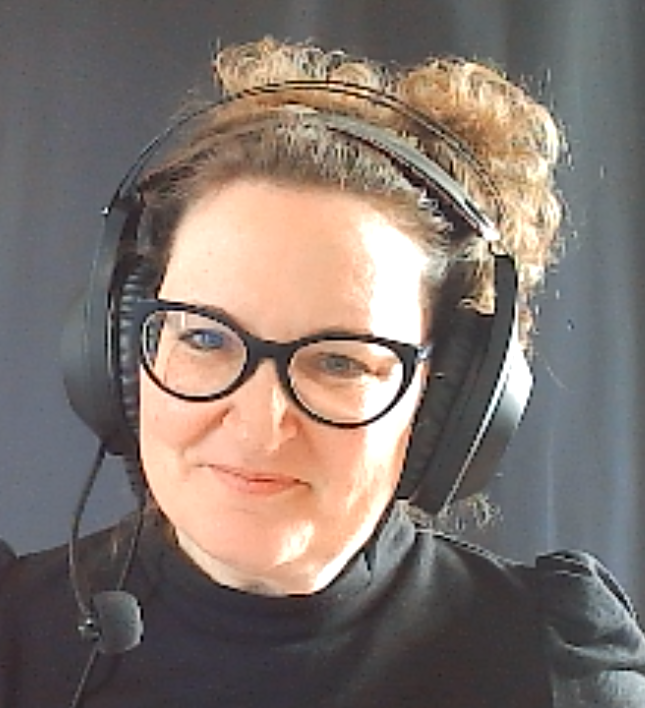#173 Preparing For An International Conference As A Non-native Speaking Participant.
Experts Speak English PODCAST 9 Change Management Communication Pitfalls to Avoid & A Resilience Tip
Questions? Just call me, Corinne (English/German) on +49 173 1688006 *** Virtual Tea Break *** “Very British”
Corinne: Welcome to the Experts! Speak English! Podcast. Together we’ll discover how to talk yourself into an international career without the bullshit. And at the end of each episode, I give you an opportunity to try out what you have just learned on the show. Because I give you Coco’s Communication Challenge and that gives you an opportunity to get out there and try out one of the tools, techniques or tips that you will have heard on the show.
Hi there. I’m Corinne Wilhelm. I’m a Corporate Communication Coach with over 20 years experience of helping leaders to secure the career that they deserve through intentional communication, intercultural awareness, and the confidence to show up as the English speaking expert.
So, let’s get cracking, shall we? And today, I have a wonderful guest on the show, and we’re going to be talking about how Kathryn Read is helping small and medium sized enterprises or SMEs to export to Europe and Asia, because many small and medium sized enterprises don’t even think about this because it all feels rather intimidating. But Kathryn is there to save the day. Kathryn, welcome to the Experts! Speak English! Podcast!
Kathryn: Thank you for inviting me. It’s always a pleasure to be on a podcast.


Corinne: Great. So, you might be able to hear that we are both from England and yet I am based in Germany and Kathryn is based in Austria. So, tell us, how did you end up in Austria and could it be that you had a little stop in Asia on the way there?
Kathryn: Um, actually, I never had a stop of living in Asia, although it often did feel like that in the past. So, I ended up in Austria as a typical English assistant from my university year abroad.
Corinne: Was it an Erasmus-programme?
Kathryn: The Ministry for Education Exchange. So, I was teaching English in two Austrian grammar schools, about four kilometres up the road from where I’m sitting right now. And having had a great time on my year abroad, then I looked for a way to kind of extend that fun beyond graduation in a way that would seem reasonable to parents. And so I found a university course in export and international business based here in Austria, got my old job back at my two grammar schools and did that course on Friday afternoons in the evenings and Saturday mornings for a year. So that was kind of how I got into export. And I was then back in the UK for a few years working in a company who were exporting, and then I had the opportunity to come back to Austria and grabbed with both hands and spent 18 years working in one company in baby food, before I decided that I wanted to strike out on my own. And that is how I ended up where I am now.
Corinne: Fantastic. Right. I think it’s very intriguing because what happens with me is very often I’ll be working with a company and I might be working with the CEO or maybe the Head of Marketing or something like that, and then suddenly I’ll get this call and it goes something like this: “Corinne! Corinne! You’ve got to help me, we got this letter. You got to read it. I think we’re being ripped off!”, and it’s just like: “Whoa, easy, tiger!”. It’s often that they’ve received a letter and they don’t know, you know, are they being ripped off? Is it rude? Is it… – they don’t know how to read between the lines. And it’s a situation in which very often I think, “Oh, what a shame that I wasn’t involved at the beginning because then I could call this person, you know, their assistant or something and just explain, you know, “Okay, we’ve received this letter. Let me just chat this through with you”, because I think getting on the phone is so valuable, right? Rather than all this to and fro of emails. But because I’ve been brought in very late then it’s very difficult to say, “Oh, we’ve got a new member of the team”, you know? So, it’s tricky. Have you ever had that situation before?
Kathryn: It happens a lot in export and it’s often because rather than doing export systematically where they sit themselves down in a room with a few people out of the team and say, “Okay, we would like to do international business as being a way for mitigating risks or at least spreading risks and expanding. And so, let’s make a proper international expansion strategy”, and “How can we do it? Maybe we need to bring somebody in who’s an expert on this”. They say, “Oh, we’ve got an enquiry from somebody in Burundi, maybe we could export?!” They don’t stop to consider firstly, whether Burundi is the right place for their products to be exported to – sorry to anybody from Burundi, but… – and they also don’t stop to consider whether the company who’s actively contacted them is actually the right kind of partner for them. They just see it as an opportunity to do some extra business and they jump straight in and start working. And then suddenly there comes a point where there’s conflict because they haven’t actually got their strategy in order and they suddenly realise that there’s actually some kind of gap between what the expectation of the client is and what their expectations are, because nobody’s really talked about that in the beginning and thought about how they actually want to go about things in the right way.


a surprise opportunity rather than a strategic decision


Fiddling is the dishonest practice of benefiting financially by altering financial documents for instance travelling expences with a partner instead of purely business.
Corinne: And I get that, you know, if you’re a smallish company and you get a situation like that, it’s kind of quite exciting, isn’t it? It’s easy to get caught up in the flurry of that, but yeah, doing things strategically and planning ahead is definitely something that is worthwhile doing and that’s when you jump on board, is it?
Kathryn: That would be ideally when I would jump on board and work together, even if it’s just a simple half day or one day workshop to sit and say, “Okay, what would we need in our company if we want to expand internationally, what would we need to put in place internally? Are we fully behind it? Do we have the resources that we need to export? Are we prepared to, you know, to go through it and take the chance? Because at the end of the day, it’s not always that easy and to work through what would be the best markets for us to go into, because for example, for a small German company then maybe Austria is a good market to go into because you don’t have that kind of language barrier, it’s not very far from home, you can do it quite cheaply.
Corinne: You can drive there if you need to, you know, it’s all very (…)
Kathryn: You can drive there if you need to, it’s within the EU, so, it’s – from a legal perspective – the risks are kind of limited, let’s say. I think what people tend to do is even if they start saying, “Okay, we want to expand internationally”, they certainly say, “Well, I’ve always wanted to visit Dubai, so…” and, you know, and they kind of make a decision out of this, like if they make one of these gut decisions about where they might like to go and play golf or where the air miles are good or… the wife always wanted to go to Paris, so let’s sell to France”, you know?
Corinne: Interesting. So that’s why these business expenses get fiddled.
Kathryn: One of the reasons, probably.
Corinne: No, I mean, that’s very interesting, isn’t it? I’d never even thought about that as being an approach but thank you. You’ve just opened my eyes.
Kathryn: It’s not something I’d recommend, but…
Corinne: No, I can imagine. Okay, then. So, if a German company then is selling to somewhere like, I don’t know, Israel or something – what’s likely to come up there? You know, there are historical background noises going on there. (Kathryn: Yeah.) So how do you deal with that kind of situation?
Kathryn: I think.. you have to, first of all, do your homework before you go into that situation. If you’re going into a new market, then you need to research how the culture is in that market, how open are they when you visit them for the first time? Because there are some cultures like the US where you visit people and on the surface they’re very open, they’re very friendly, they’re very smiley, but it’s actually quite hard to get to know them on a deeper level.
There are other cultures like maybe Finland or somewhere in Scandinavia, where if you visit people for the first time, they are polite, they’re hospitable, but they’re not that kind of “open hands”, they’re not gushing in the same way that you might find. And so, it’s important to know what to expect and how to manage people. So, for example, Israelis are very direct when they do business, and they also work with quite flat hierarchies.
Corinne: So quite a challenge for Germans then.
Kathryn: Especially in old companies, not so much in start-ups. Established companies are often quite hierarchical and everybody uses or often they use the polite form of “you” for the top management, whereas in an Israeli company, probably everybody is using first names and that could be quite a shock for an established CEO who maybe travels there for the first time and he’s suddenly greeted by somebody he sees as being like assistant by his first name. And he’s like, “Oh,” (Corinne: Oh, freaky, yeah.), they’re not polite, you know?
Corinne: Yeah. And this is often seen as being disrespectful, right? Yeah, they wouldn’t even think about it. And that’s exactly the point: “I didn’t even think about it”. That’s where conflict happens.

In many languages there is a way to address people formally and informally and this will be tied up with how you address them by name, so in some cultures surnames and the formal approach are normal, whereas other cultures (including corporate cultures like start-ups) there is a more informal approach, often with first names. If you get this wrong you could get off to a bad start

To bring someone back to reality, especially if they are dreaming or fantasizing about something unrealistic. "Look, I hate to burst your bubble, but there is no way you'll be able to sell your high value solution in such a crowded market!"
Kathryn: Exactly. And it’s all of those kind of things. How do people deal with the situation of saying, “I don’t agree with what you’ve just proposed” or, “We can’t do it that way because…”, if we continue with the example of Israel, they will just tell you straight between the eyes, “I’m sorry, we can’t do that because our production can only work like this and like that”. They’ll be very direct about it.
Corinne: People underestimate as well how expensive and how complicated it is to change a production system, especially if you’re coming in for a trial. You know, your first encounter with them will not be a huge order. It will be a small order and so therefore, to expect people to change your whole manufacturing system for a small batch is unrealistic. And so I can get that how that could be very frustrating.
Kathryn: Yeah. And I think that both sides have to know how to manage the expectations of the other. On the one hand, it’s very difficult to make a bespoke production for somebody who is a new client. On the other hand, if you’re introducing a new brand into your market, it takes time. (Corinne: Yeah.) You have to find a way of being realistic about that without kind of bursting the bubble of the other party’s enthusiasm.
Corinne: It’s also very closely affiliated with your emotions around things, isn’t it? You know, if it’s a smaller, a medium-sized company, the owner is.., maybe it’s a family business, you know, and then, of course, they’re very emotive about things because it’s like their baby. And that’s the tricky thing, isn’t it, with communication, if you are too emotionally wrapped up in things, you will not communicate as well as if you try and keep yourself a bit of distance and treat it pragmatically and try not to.. Don’t take anything personally, it’s just a transaction. But it’s easier said than done slightly.
Kathryn: Absolutely. And on the other hand, you also have to really remember: Everything, which is to do with the product or the service that you’re offering, this we don’t take personally. Everything which is to do with how do I work with this of the company that I’m now talking to, be it in Sweden, or be it in Uzbekistan, I have to really invest in the relationship because at the end of the day business is done between people and you can have the best product in the world but, if the chemistry isn’t right, you might do one order but you’re unlikely to have a long-term business relationship that develops and grows.
Corinne: That’s right. And likewise, if, say, for example, you were the Export Manager and then, you know, I’m always used to speaking to this British girl. She’s always great and she gets things done. And then I call back a second time and there’s a tragic situation that needs to be sorted right now and you happen to be on holiday, because we can all go on holiday, right? And I get somebody else that can be really quite horrendous if you’re in a panic situation. I think it’s very important to think about the communication as being between teams and not too much between one person and another, if at all possible.
Kathryn: Yeah, and I think you have to also accept that there are people in the office who will probably never have the opportunity to travel to that country because it’s not financially practical to do that. But, if you have the opportunity to bring those team members, for example, maybe to an exhibition or if you have the opportunity to bring that partner to your offices for some training at the beginning, then it makes sense to introduce them to as many members of the team as possible so that they’ve got a face to the name.
It’s really hard to say a really hard “No” to somebody if you’ve sat down and had, maybe you’ve had lunch together in the company canteen or you’ve had a really nice coffee together and a really nice chat and you know that their kids are the same age as yours and they all like playing football or, you know, you’ve got some kind of personal attachment, the team member or you personally, you’re also more likely to go the extra mile for that person, that you have some kind of personal connection to. Even if it’s very tenuous and small, then if it’s somebody that you sat down with and thought “What kind of an (idiot) is that?”.




Corinne: Yeah, absolutely. Yeah. I think soft skills are so underappreciated, aren’t they? You know, they’re so subtle soft skills and yet they have such a massive punch that unfortunately, is so difficult to measure.
Kathryn: Yes. And I’ve seen in the past where there have been people in the back office who’ve been very open for different cultures and who’ve appreciated that customer A, who is from Asia, will call and they’ll need something and they’ll only call if it’s, you know, if there’s a huge fire on their end so they’re only calling like in the case of true emergency. And there might be another customer in Eastern Europe who cries wolf for every opportunity. (Corinne: Right.) You know, what was that advert that they used to be in the UK: “We won’t make a drama out of your crisis”. There are some people who will make a drama out of every crisis.
Corinne: That’s true, that’s true. Yeah. There are some people who send emails for every single little thing and I see seeing everybody in their brothers’ cats cuddly toy and you know, it kind of gets a little bit draining. And I think you have to be very aware of your boundaries and your limits. And I think you have to kind of live by those, too. If somebody sends you an email at 11 at night and they expect an answer, don’t write back to them at 11:05. So, wait until the morning. Of course, it’s easier said than done. And you don’t want to lose a good client, but it’s all about managing your boundaries. And boundaries are the key to mental health. So, if you’re struggling to sleep, the chances are that there is something else going on that is putting you under pressure.
Kathryn: Yeah. And you also – in the opposite direction – have to understand that, especially if you’re working with big differences between time zones that you need to consider how does that culture deal with setting boundaries and mental health issues as well. Because at the end of the day, most of us know that if you’re working with the Managing Director, then you need to also keep on the right side of his assistant. (Corinne: Oh yeah.)
If he is in the culture, as is often the case in Asia, be that in South Korea or China or Japan, where there are very few time boundaries between work and home, then you need to think about the time that you send your email. Because if you send an email at 5 p.m. European time and that is midnight or 1, 2 in the morning in East Asia, you have to also consider that that CEO, if his English is not good enough to read the message, realise that it’s not actually urgent and he’ll just ignore it until the morning because he himself has no boundaries between work and home, but instead, he will call his assistant, ask her to translate the message for him at 2 in the morning and then he will insist that she prepares an answer to that message as well. Because the important supplier from Europe has just sent a message and therefore it has to be answered right away. So, you have to think about whether it’s better to switch those things around.
Corinne: But it all comes down to a matter of communication, isn’t it? You know, which is, I think you listen to that podcast as well. (Kathryn: Yes.) And, you have to establish these things right from the get-go, “Okay, listen, we’re going to be working together. Which time band are we going to communicate with each other?” and ask people how they want to communicate and all of this stuff. I think that’s so important. But especially when you’re working inter-culturally. How would you work with somebody then who they started the export game, if you like, and they’ve come across a problem and inevitably you get called for this kind of situation, I would have thought, is that right?
Kathryn: Yes, it happens.
Corinne: How would that work then? for you? Do you have some kind of rescue package?
Kathryn: It depends* (see the video) a little bit on what the situation is. Sometimes, there are companies who may be already doing export within Europe, especially if we’re talking German or Austrian companies. Probably they’re already exporting within Europe and maybe their export team doesn’t really have the time resource to do the export also to Asia. So, maybe I get called in in those kind of cases to be a kind of extended member of the sales team. (Corinne: Right.) For a certain period of time to get things moving, to deal with the set-up period and then hand over to somebody within the company.
Corinne: Okay, that makes sense.
Kathryn: That’s one of the scenarios. Or the other scenario is that maybe the company has somebody, maybe their experienced in export, but not for the Asian markets or not for the market, which is in question. Maybe that could be Turkey or Israel or something like that. And then I might be called in to do a kind of, let’s say, a handholding exercise and to work together with that person so that they know how to be a kind of bridge and to help them understand what is being said. When they say “X”, what do they really mean? Because it’s not always the same thing, is it? To do that “reading between the lines”.
Corinne: But that reassurance is very, very valuable, I think, you know, to people, especially when you’re setting out. It’s a bit like onboarding, isn’t it, really? If you think about it, you have somebody who is kind of buddying that person and looking out for them and you know, you say, “Oh, you know, the word in that email was, hm, I don’t know about that” you know “Let’s look at that next time together” or “Look at what he wrote to you there. Do you see what is happening there”, you know? And these subtle things can make a big impact, right? So, I think that’s a great idea. Yeah.



Kathryn: And it’s really hard to explain to, for example, a German, that the reason we are sitting and drinking tea for 2 hours and making small-talk is because once you’ve done that and you’ve established, you’ve re-established your relationship with that person that you’re sitting with or that company team, after that, the work will go much, much faster.
Corinne: Yeah. So, it’s a bit like building the foundation of a house really, isn’t it?
Kathryn: Yes, exactly. And I think that there are a lot of cultures, for example, a US American, you can kind of build the plane whilst you’re already taxiing along the runway. You know, you can do that relationship work as you’re doing individual tasks at the same time. Every culture needs the relationship, but Asia or I think also in South America, you need to invest the time in advance to build the relationship before you can really start talking about the work in a constructive way. And that’s very hard to manage. If you’re a Sales Manager, you’re on a two- or three-day business trip, you’ve got a limited amount of time and your boss is expecting you to come home with an order or with, you know, with some concrete milestones reached. Then, actually, you might feel like, “Well, we’ve just drunk tea. Now they’ve asked us if we want to play Mah-Jong and then they asked if we wanted to go for lunch. And then, when we came back from lunch there was more tea. Then we had a bit of a discussion, but then it was time for dinner and after dinner we went for karaoke and there was an awful lot to drink. And now I’m feeling “eew”, but tomorrow we’ve got 3 hours in the office and then I need to go to the airport. And so you come into the office, the next morning and you’re like, looking a bit green maybe, you know? A lot of the team is probably as well. And suddenly you discover everybody’s like talking about all of this important stuff in the last couple of hours and it’s all kind of whizzing by you because you’re overtired and feeling…
Corinne: Oh wow, what a great… Yeah, that’s a very good insight. Thank you.
Kathryn: I mean, especially when it comes to things like.. if you have a business trip to Asia, then chances are, especially on the first business trip that you do a lot more relationship building at the beginning before you actually get to what feels for you like the real work.
Corinne: I think that could be tricky for some cultures.
So, I’ve got one more question before we gradually close with our Communication Challenge. So, Kathryn, what about if you want to work with developing markets, you know that that’s a good thing to do, you know, you’re giving something back to the economy there. You’re helping them as well as yourselves. So, is there anything there that people need to be aware of? You know, I guess the things that people maybe think of are legal problems or maybe being ripped off or the product being ripped off. Is there anything else that people need to be aware of or need to get advice on, really?
Kathryn: Of course, the legal issues are always a big topic and as much homework as you can do in advance, be that buyer, your trade commissioner or somebody else who’s doing business in the area already is always a great thing to do. I think you just need to be aware that the gains can be much bigger if you’re going into a developing market because there might not be as much competition as if you decide to go into France, for example, where pretty much everybody’s there already.
On the other hand, there might not be the same level of infrastructure. Their staff may not have the same levels of education, simply because they don’t have the same access to international education. So, I think you need to be even more aware of cultural differences and you need to be even more empathetic towards what is their situation. Because especially if you’re trying to sell expensive products, then you have to accept that in almost every country of the world there will be people who can afford to buy your products and there will be a market. But that market might be a completely different one in terms of the size as a percentage of the total market or in terms of how people actually use your products. You know, it may be that one part of your range is the main product in Europe, but completely different part of your range is most popular in a developing market because they have different purchasing power, different consumption habits, and they’re not quite ready for some parts of your range yet. So you have to be aware of those issues and just take it step by step.
Corinne: You need to be a bit more patient maybe.
Kathryn: Yes, yes.
Corinne: Interesting.
Kathryn: I would say the challenges are worth it. Those have always been the markets that I’ve really enjoyed working together with and seeing the market develop. And you grow with the market is a tremendous opportunity for a brand or for a company.
Corinne: Yeah, definitely. Yeah. So, which of the developing markets that you’re the most excited about at the moment then?
Kathryn: Vietnam, I would say. For me, in Asia it’s Vietnam, one of the most exciting developing markets. I love also working with China and the Philippines, but certainly China in lots of categories is a very developed market already. And so it’s not that easy to get into, although the opportunities are still huge there.
Corinne: Wow. Excellent. Well, thank you very much for that.


The Communication Challenge for this week is: To go to Kathryn Read’s website. It’s that easy: kathrynread.com, isn’t it? (Kathryn: Yes.) And you go there and she has a step-by-step guide to deciding which new markets to target. So I want you to go to that website, download it, have a good read of it, and actually have a real good brainstorm about where you want to go with this.
And then, on Tuesday, the 17th of January at 2:30, we’re going to have a live event where you can run these things pass Kathryn, and we will talk to you about your decisions or about your thoughts and Kathryn will advise you. If that sounds good, then make sure you go to Kathryn Read’s website, download that report, do your homework, and we’ll see you either in a live event running through LinkedIn or an audio event, we haven’t quite decided yet.
So the best thing to do is to connect with us both on LinkedIn, it’s Kathryn Read and Corinne Wilhelm, and also sign up for my newsletter. You’ll get all of the juicy details there. We will see each other at that event.
All that remains for me to say is: Have a fabulous week! Be the very best communicator that you can be, no matter who you’re speaking with and wherever you are in the world.
You’ve been listening to Corinne Wilhelm and Kathryn Read on the Experts! Speak English! Podcast. Take care now. Have a fabulous week and I will see you next week for a new episode of Experts! Speak English!, brought to you by englishspeakingexperts.com.
And just a heads up from next week: This podcast, the Experts! Speak English! podcast will be going out every Monday. So, there’s a slight change of schedule. The good news is: You don’t have to wait very long for the next episode. It goes out on Monday, the 9th of January, and from then on it will be going at every Monday afternoon. So I’ll see you on Monday!

I'd love your help
I’m busy planning for 2023
I’d love to hear what you would love more of or which episodes you really enjoyed and why?
If you email me at corinne@englishspeakingexperts.com with your feedback or a suggestion, I’ll mention you in the show when it comes round – perhaps you could join me as an expert
Join our mailing list for communication insights in English that get you noticed at work.
Dazzle your team and boss with presentations that inspire them to innovate and improve
Get career-boosting tips and tricks to take your career up a notch
Be the first to find out about innovative training solutions online, outdoors and overseas
And get a taste of what it’s like to become an English Speaking Expert.
Experts Speak English PODCAST 9 Change Management Communication Pitfalls to Avoid & A Resilience Tip
Experts Speak English PODCAST 9 Change Management Communication Pitfalls to Avoid & A Resilience Tip